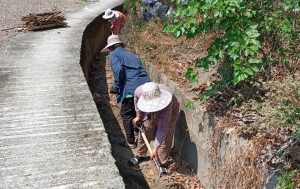The DSWD Field Office 1 starts implementing the Risk Resiliency Program (RRP) through Cash-for-Training (CFT) and Cash-for-Work (CFW) in Region 1. This year’s RRP implementation aims to combat the effects of El Niño specifically through Project LAWA at BINHI.
The Project LAWA (Local Adaptation to Water Access) at BINHI (Breaking Insufficiency through Nutritious Harvest for the Impoverished) is a proactive intervention and sustainable solution that addresses food insufficiency and water scarcity brought on by climate change, thereby reducing hunger, easing poverty, and reducing the economic vulnerability of communities.
There were 9,978 partner-beneficiaries from the 20 target Local Government Units (LGUs) across the Region.
One of the target municipalities in the Province of Ilocos Sur is the Local Government Unit of Quirino. The municipality has 231 partner-beneficiaries who underwent CFT from 25 to 27 March 2024.
The three-day learning and development sessions focused on Disaster Risk Reduction (DRR) and climate change adaptation. Skills training was also conducted to prepare the partner-beneficiaries for the second stage of implementation of the program which is the CFW.
The partner-beneficiaries were divided into two batches for the implementation of the second stage having two phases. The first phase focuses on implementing projects and interventions on water sufficiency, while the second phase focuses on food security.

On 1 April 2024, the first batch of partner-beneficiaries started working on rehabilitating the community water system and rehabilitating irrigation canals. They will be working for 15 days to finish the project.
After which, the second phase will commence in which the other half of the partner-beneficiaries will be working on communal gardening for 15 days for food security.
Along with the LGU Quirino, Ilocos Sur, the LGU Burgos, Pangasinan which had 328 partner-benefciaries and LGU Urbiztondo, Pangasinan with 1,193 partner-beneficiaries began implementing the RRP.
RRP is a program that provides additional income to economically disadvantaged, climate change and disaster-vulnerable families and communities while empowering communities to become resilient to these threats. (by Henry J. Juyno, Information Officer II, Social Marketing Unit/ Disaster Response Management Division-Disaster Response and Rehabilitation Section)

